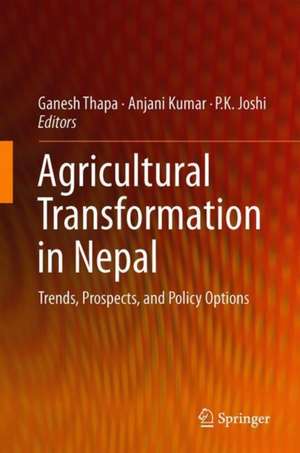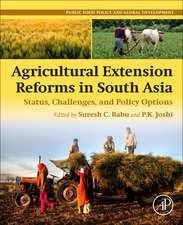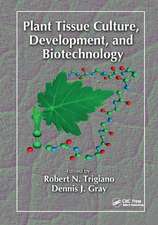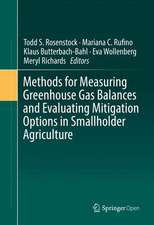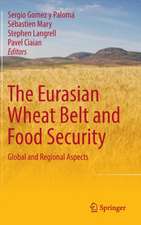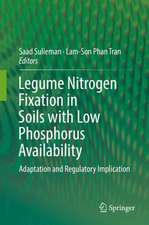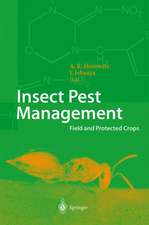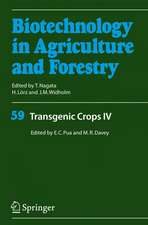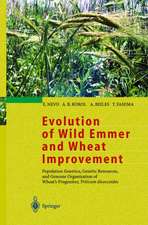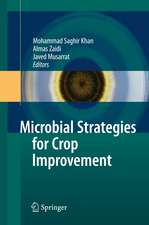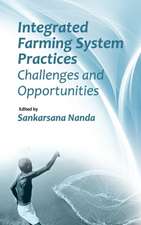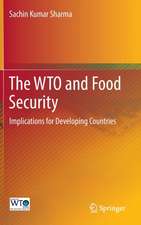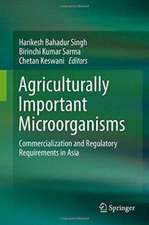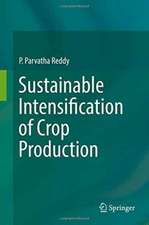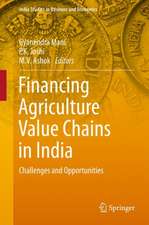Agricultural Transformation in Nepal: Trends, Prospects, and Policy Options
Editat de Ganesh Thapa, Anjani Kumar, P K Joshien Limba Engleză Hardback – 6 dec 2019
This book addresses some key strategic questions related to agriculture in the context of major contemporary developments and emerging challenges in Nepal such as the changing role of agriculture with economic growth, structural transformation in reducing poverty, improving nutritional outcomes, and addressing the challenges of climate change. The book also suggests policy measures to improve the delivery of critical inputs and services and ensure the participation of marginal and smallholders in high-value chains. Further, it discusses how the new federal system and governance structure will affect the delivery of agricultural technology and services.
The book is divided into five parts. Part I discusses macro-issues in the agriculture sector, while Part II focuses on agricultural productivity growth and its main drivers. The third part explores diversification in the agricultural and non-agricultural sectors by farmers and other rural people for livelihoodimprovement, while the fourth part deals with agricultural trade and marketing issues, highlighting policy implications and recommendations in the areas of immediate focus and further research. Lastly, Part V addresses institutions and governance issues, which are vital for agricultural development. In the final chapter, the editors summarize and synthesize the book’s main findings and develop a policy agenda for addressing the many challenges faced by the agriculture sector in Nepal, so as to make it more productive, competitive, sustainable, and inclusive.
The book offers a rich source of analytical information on various aspects of agricultural development in Nepal and will be of immense value to policymakers, development partners, civil society, students, and those interested in the economic and agricultural development of not only Nepal, but also other developing countries.
| Toate formatele și edițiile | Preț | Express |
|---|---|---|
| Paperback (1) | 811.58 lei 38-44 zile | |
| Springer Nature Singapore – 3 ian 2021 | 811.58 lei 38-44 zile | |
| Hardback (1) | 831.65 lei 38-44 zile | |
| Springer Nature Singapore – 6 dec 2019 | 831.65 lei 38-44 zile |
Preț: 831.65 lei
Preț vechi: 1094.28 lei
-24% Nou
Puncte Express: 1247
Preț estimativ în valută:
159.13€ • 166.60$ • 131.67£
159.13€ • 166.60$ • 131.67£
Carte tipărită la comandă
Livrare economică 01-07 aprilie
Preluare comenzi: 021 569.72.76
Specificații
ISBN-13: 9789813296473
ISBN-10: 981329647X
Pagini: 628
Ilustrații: XLIII, 628 p. 90 illus., 79 illus. in color.
Dimensiuni: 155 x 235 mm
Ediția:1st ed. 2019
Editura: Springer Nature Singapore
Colecția Springer
Locul publicării:Singapore, Singapore
ISBN-10: 981329647X
Pagini: 628
Ilustrații: XLIII, 628 p. 90 illus., 79 illus. in color.
Dimensiuni: 155 x 235 mm
Ediția:1st ed. 2019
Editura: Springer Nature Singapore
Colecția Springer
Locul publicării:Singapore, Singapore
Cuprins
Chapter 1. Introduction.- Part I Macro-issues in Agriculture.- Chapter 2. Structural Transformation & Growth: Whither Agriculture in Nepal.- Chapter 3. The Role of Agriculture in Poverty Reduction in Nepal.- Chapter 4. Food Consumption Patterns and Dietary Diversity in Nepal: Implications for Nutrition Security.- Chapter 5. Food Inflation and Its Implications in Nepal.- Chapter 6. Climate Change Impact on Agricultural Sector of Nepal: Implications for Adaptation and Resilience Building.- Part II Productivity Growth and Its Drivers.- Chapter 7. Food Demand System and Projections to 2035: Nepal.- Chapter 8. Seed Sector Development in Nepal: Opportunities and Options for Improvement.- Chapter 9. Use of Chemical Fertilizers in Nepal: Issues and Implications.- Chapter 10. Agricultural Mechanization in Nepal: Patterns and Enabling Strategies for Promotion.- Chapter 11. Agricultural Research and Extension System in Nepal.- Part III Agricultural Diversification.- Chapter 12. Agricultural Diversification in Nepal.- Chapter 13. Growth of Non-timber Forest Produce, Medicinal and Aromatic Plants and Agro-forestry Sub-Sectors and Their Environmental and Socio-economic Implications.- Chapter 14. Migration and Remittances: Impact on Food Production.- Part IV Agricultural Trade and Marketing.- Chapter 15. Trends, Structure and Drivers of Nepal’s Agricultural Trade.- Chapter 16. Agricultural Marketing and High-Value Chains: Enhanced Role for Private Sector Towards Value Chain Integration.- Part V Institutions and Governance.- Chapter 17. Agrarian Relations, Institutions and Land Reform in Nepal.- Chapter 18. Agricultural Credit and Insurance in Nepal: Coverage, Issues and Opportunities.- Chapter 19. Nepal’s Changing Governance Structure and Implications for Agricultural Development.- Part VI The Policy Agenda.- Chapter 20. Concluding Chapter- the Policy Agenda.
Notă biografică
Dr. Ganesh Thapa worked for the International Fund for Agricultural Development (IFAD) from March 1998 to April 2014 as the Regional Economist for Asia and the Pacific region and as the Country Programme Manager for North Korea. He is currently a Visiting Scientist at the International Centre for Integrated Mountain Development (ICIMOD). He holds a Ph.D. in Agricultural Economics from Cornell University, USA, and degrees from the University of the Philippines and G.B. Pant University of Agriculture and Technology, India. As the Regional Economist, he led IFAD’s work on policy analysis and strategy formulation for agricultural development and rural poverty reduction in Asia and the Pacific region. Prior to joining IFAD, he worked as the Country Director for Winrock International in Nepal and led a project on policy analysis in agriculture and natural resource management. He has also worked as a Senior Economist for the Ministry of Agriculture, Nepal. He has conducted research and published books and articles on such topics as risks, vulnerability, and poverty reduction; sustainability of microfinance; indigenous peoples and poverty reduction; effects of new agricultural technologies on income distribution; constraints on agricultural marketing; and food security and environmental policies.
Dr. Anjani Kumar is a Research Fellow with the South Asian Chapter of the International Food Policy Research Institute (IFPRI) based in New Delhi, India. He obtained his Ph.D. in Dairy Economics from the National Dairy Research Institute (NDRI), Karnal, India, and has over two decades of research experience in dairy economics, trade, food safety issues, food and nutrition security, agricultural growth, etc. He has to his credit several awards including the Lal Bahadur Shastri Young Scientist award, and awards from the Dr. R. T. Doshi Foundation and National Academy of Agricultural Sciences. Prior to joining the IFPRI, he was a Principal Scientist at the National Institute of Agricultural Economics and Policy Research (NIAP) and at the International Crops Research Institute for the Semi-Arid Tropics (ICRISAT). He also worked as a Senior Agricultural Economist with the International Livestock Research Institute (ILRI).
Dr. Pramod Kumar Joshi is Director, South Asia, of the International Food Policy Research Institute (IFPRI). He previously served as Director of the National Academy of Agricultural Research Management (NAARM) and National Institute of Agricultural Economics and Policy Research (NIAP). He holds a Ph.D. in Agricultural Economics from G.B. Pant University of Agriculture and Technology, Pantnagar, India. He has more than four decades of research experience in technology policy, research evaluation, impact assessment, agriculture marketing, institutional innovation, water markets, trade, etc., and is a recipient of several awards such as the Professor R. C. Agarwal Lifetime Award, Dr. M. S. Randhawa Memorial Award ofthe NAAS, D.K. Desai Award of the Indian Society of Agricultural Economics, and Dr. R. T. Doshi Foundation Award.
Textul de pe ultima copertă
This book addresses some key strategic questions related to agriculture in the context of major contemporary developments and emerging challenges in Nepal such as the changing role of agriculture with economic growth, structural transformation in reducing poverty, improving nutritional outcomes, and addressing the challenges of climate change. The book also suggests policy measures to improve the delivery of critical inputs and services and ensure the participation of marginal and smallholders in high-value chains. Further, it discusses how the new federal system and governance structure will affect the delivery of agricultural technology and services.
The book is divided into five parts. Part I discusses macro-issues in the agriculture sector, while Part II focuses on agricultural productivity growth and its main drivers. The third part explores diversification in the agricultural and non-agricultural sectors by farmers and other rural people for livelihoodimprovement, while the fourth part deals with agricultural trade and marketing issues, highlighting policy implications and recommendations in the areas of immediate focus and further research. Lastly, Part V addresses institutions and governance issues, which are vital for agricultural development. In the final chapter, the editors summarize and synthesize the book’s main findings and develop a policy agenda for addressing the many challenges faced by the agriculture sector in Nepal, so as to make it more productive, competitive, sustainable, and inclusive.
The book offers a rich source of analytical information on various aspects of agricultural development in Nepal and will be of immense value to policymakers, development partners, civil society, students, and those interested in the economic and agricultural development of not only Nepal, but also other developing countries.
Caracteristici
Provides a blueprint for sustainable and inclusive agricultural growth Covers a wide range of issues and presents policy options for the government and other stakeholders to address emerging challenges and to benefit from new opportunities Draws lessons for Nepal from the experiences of other countries such as India, Indonesia, Kenya, Malaysia, and South Africa
